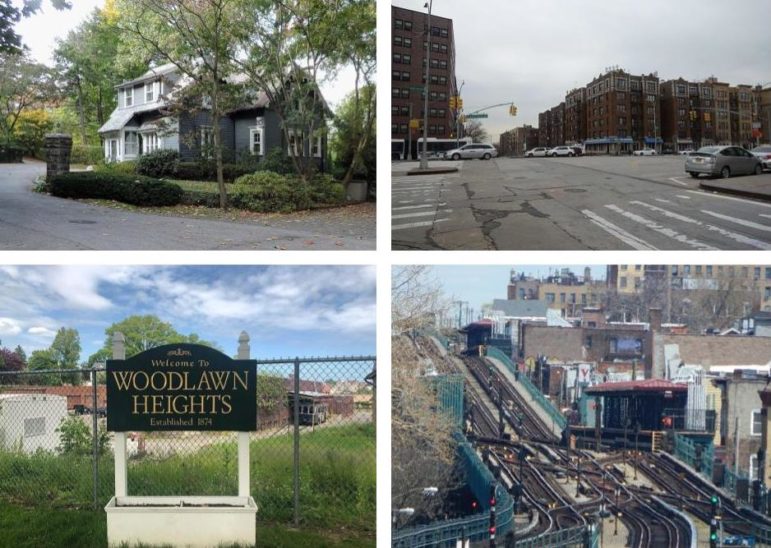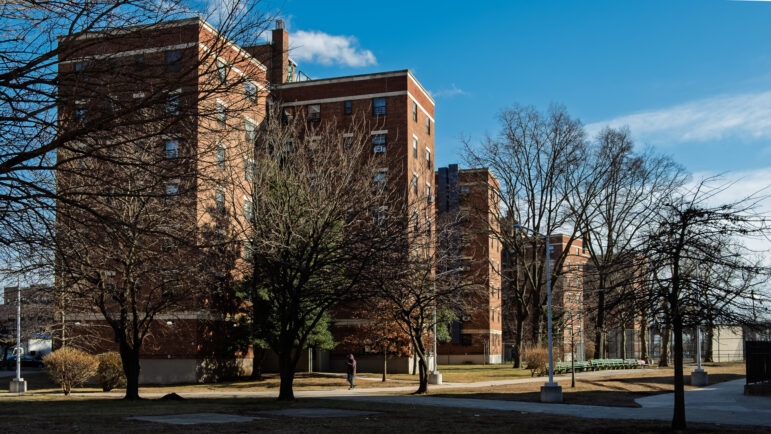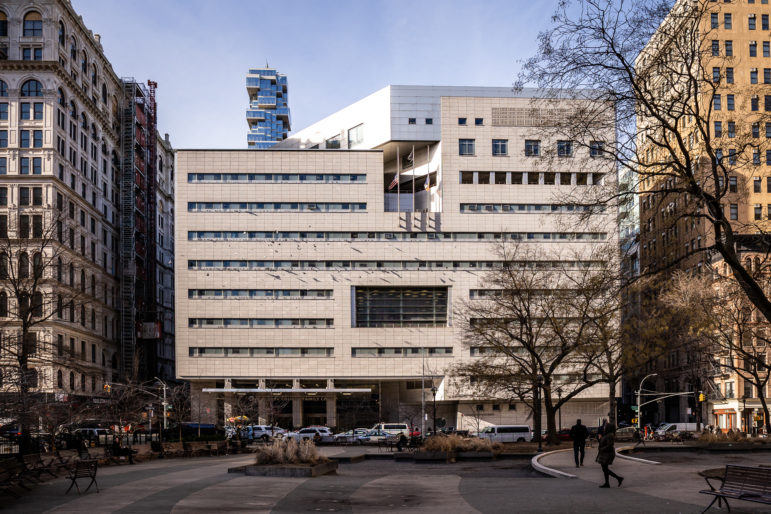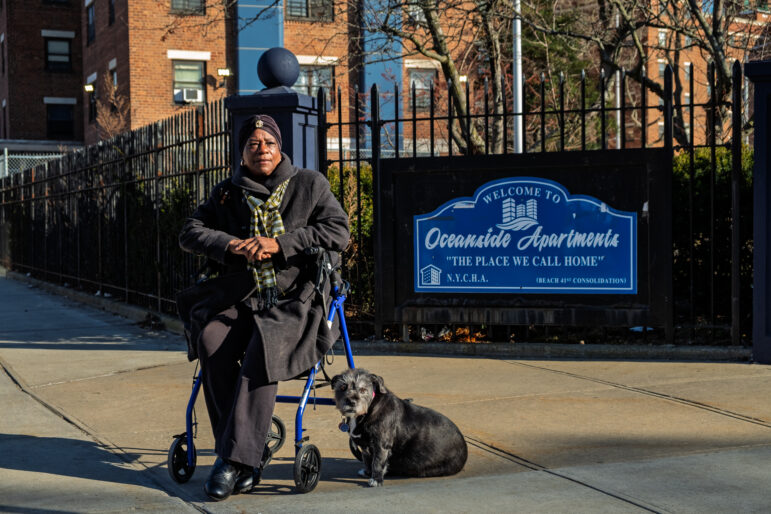
Adam Moss, Tdorante10, Jim Henderson, Hugo L. González
Scenes from District 11, clockwise from top left: A home in Riverdale, an intersection of Bedford Park, a view of Wakefield and the entrance to Woodlawn Heights.This story is part of a City Limits’ series on the 2021 City Council races in partnership with Gotham Gazette, City & State and the Queens Daily Eagle. To read more, visit our Council Countdown page.
What’s in a name? The 11th District City Council primary is likely to find out.
Eric Dinowitz, a special-education teacher who won a March 23 special election, was undoubtedly helped in that cause by his family name. His father, Jeff Dinowitz, has represented the northwest Bronx in the state Assembly since 1994.
Dinowitz topped five other candidates to prevail in the special election, which was called after Andrew Cohen resigned to take up a judgeship. Dinowitz is now the sitting councilmember, serving out the remainder of Cohen’s term, which ends Dec. 31.
The June 22 primary—early voting begins June 12—will pick a Democratic nominee for the November general election. The winner there, who will almost certainly be the Democrat, will represent the neighborhoods of Bedford Park, Kingsbridge, Riverdale, Norwood, Van Cortlandt Village, Wakefield and Woodlawn in the Council over the 2022-2023 term.
In March, Dinowitz led the field on the first round of balloting with 46 percent of the vote; his closest competitor, nonprofit leader Mino Lora, had 22 percent. Dinowitz crossed the 50-percent threshold after four rounds of ranked-choice tallying, and finished with 58 percent of the vote in the fifth and final round.
Lora remains in the mix for the June election, as do attorney Dan Padernacht and retired detective Carlton Berkley. Kevin Pazmino, a conservative videographer who ran in March, will not be on the June ballot. Environmentalist and entrepreneur Jessica Haller, who placed third in March, will have her name on the June ballot but has dropped out of the race, having taken up the leadership of “21 in 21,” a project aiming to increase the number of women on the Council. Two candidates who were not involved in the March special election—teacher Abigail Martin and businessman Marcos Sierra—are on the ballot this time.
Both the newcomers have been running for many months, but they opted not to contest the special election. “Everyone knows that special elections favor machine candidates,” Martin says. “I wasn’t going to play that game and give the machine what they wanted.” Sierra says he skipped the March contest because of the pandemic. “My decision to not participate in the special election arose from ensuring the health and safety of not only myself and my family, but also of my team,” he says. “While petitioning was happening for the special, Wakefield and Woodlawn were experiencing an almost 20 percent [infection rate].”
Take 2, or a fresh slate?
Other than a few changes to the cast of characters, the question is whether anything else will be different this time. Dinowitz’s strong performance, and the durability of the advantages he rode to achieve it, auger against any major shift. “I see a do-over,” says Haller. “The reason I dropped out is I don’t think anything dramatic will change in a three-month period.”
But others believe there is a path for Dinowitz to be upset. For one thing, the special election results indicate that Dinowitz picked up votes from many candidates eliminated during ranked-choice voting—suggesting that his rivals will need to draw a deeper distinction with him this time, perhaps leading to sharper exchanges.
Meanwhile, the arrival of spring and the COVID-19 vaccine suggest in-person campaign events will return, giving other candidates a chance to hustle for support. If anyone benefits from a largely remote campaign like the one in March, it’s the guy with great name recognition—and that advantage could be reduced in June.
Around 9,600 people voted in March out of 63,600 voters in the district. The electorate will almost certainly be larger for the primary, given the high-profile mayoral race and crowded comptroller contest—it could be twice as large.
Dinowitz’s vote count will grow as well, but it’s not clear how dominant the family brand will be. In 2020, Jeff Dinowitz faced the only primary challenge in his career representing the 81st Assembly district and defeated a political novice with 64 percent of the vote, a relatively modest share for an incumbent. On the same day, Eric Dinowitz won election as district leader in the 81st with a fairly tight 57 percent margin.
The 81st Assembly district and 11th Council district overlap almost completely. The chief difference is that the Council district includes far larger portions of Norwood and Bedford Park, areas that display lower average incomes and more racial diversity than the larger area. But the center of political gravity in both cases is Riverdale, Dinowitz’s base. Candidates pay little attention to Norwood and Bedford Park because relatively few votes come out of those areas—a strategy that, of course, means voters in those areas are less likely to come out.
It’s unclear whether money will matter in the current contest. The candidates who ran in March—Berkley, Dinowitz, Lora and Padernacht—largely exhausted the funds they’d raised: Berkley and Lora ended up with a few grand left, while Dinowitz was slightly in the red. Only Padernacht preserved a decent balance, of just over $46,000. Independent spenders played a small role in March, with three PACs dishing out $66,000 on Dinowitz’s behalf.
The runners
Here are the candidates in the CD 11, in order of their ballot position:
Abigail Martin is a social worker. Her platform, which emphasizes affordability, includes a detailed housing plan that, among other things, calls for giving nonprofit organizations and community land trusts first chance to buy apartment buildings that go on sale, and for eliminating the 421a tax break. She’s called for property-tax reform to ensure wealthy property owners pay more, but also for making the co-op and condo tax abatement permanent.
Eric Dinowitz is a public-school special-education teacher and member of Community Board 8. His platform emphasizes education, advocating for an end to high-stakes testing, more literacy support for students, better mental-health resources for schools and a greater emphasis on social-emotional learning. He also says he wants participatory budgeting to apply to the entirety of each councilmember’s discretionary funds (as opposed to a portion of those monies, as is now the standard approach).
Daniel Padernacht is an attorney and member of Community Board 8. He is arguably the most centrist candidate in the race. His platform calls for developing affordable housing that fits the income profile of the neighborhood in which it’s built, and for the city to provide tax credits and legal assistance to help small businesses afford space. He advocates for more STEAM education and sports offerings at schools. And he supports expanded community policing and has criticized rival candidate Lora for past statements in which she called for the abolition of the police.
Marcos Sierra is an entrepreneur and program coordinator for a senior center. He tells City Limits that his top priority is “getting our education system back on track to produce critical thinkers, instead of merely test takers,” “providing sufficient funding for public and mental health initiatives,” and working to expand Right to Counsel. A district leader, Sierra has endorsed Councilmember Fernando Cabrera—a veteran legislator with a reputation as a social conservative—for borough president.
Mino Lora is the founder of a nonprofit called People’s Theatre Project that works with students. She’s been endorsed by the communication workers’ union, The Jewish Vote, Zephyr Teachout, Sens. Alessandra Biaggi and Gustavo Rivera, Citizen Action and others. Her platform includes a call for cultural justice—an effort to elevate marginalized artists and offerings from communities of color, shifting billions from the NYPD budget to “schools, healthcare and recreational programs for youth” and municipal voting for residents regardless of immigration status.
Carlton Berkley spent 20 years with the NYPD, reaching the rank of detective-second grade. He lives in the Wakefield section of the district. Berkley has run for the Council twice before, in district 9 in 2009 and in district 16 in 2013, and also ran for Assembly. Berkley says public safety, housing and youth employment are his top issues and vows that, if elected, “I will continue to fight for criminal justice reform, police reform and all other injustices within the system to improve the quality of life for all people.”
District 11 is home to three colleges (Manhattan, Lehman and Mount St. Vincent), a reservoir, one of the largest parks in the city (Van Cortlandt) and Woodlawn Cemetery, whose illustrious denizens include Celia Cruz, Bat Masterson, Miles Davis and Herman Melville. The Hudson and Harlem Rivers border parts of the district, the Bronx River etches down its eastern side and three highways—the Major Deegan, Henry Hudson and Bronx River Parkway—carve through its territory. The combined effect of many of these features is to carve the district up into distinct sections.
Indeed, district 11 offers some stark contrasts, encompassing the Hudson River views of Riverdale and the dense blocks of Bedford Park, where there are still signs on lightpoles reading “Drugs Crucify.” There are yeshivas in Riverdale and mosques in Norwood and Bedford Park. There’s an Irish enclave in Woodlawn in the district’s north, and Latino, Albanian and Bengali concentrations in the south. The population density in Community District 7, which partly overlaps with the southeast corner of the district, is twice what it is in CD8, which covers most of the territory.









